Oct 10, 2025 – Return to Korea, Happy Dialogue (3) Bucheon
Hello. Today, after returning to Korea from a business trip to China, Sunim held a Happy Dialogue Dharma Q&A for the citizens of Bucheon.
After completing a survey trip for humanitarian aid to North Korea in China, Sunim departed from Shenyang Airport at 10:15 AM and arrived at Incheon Airport at 1:15 PM local time.

After leaving the airport, Sunim went directly to Seoul Jungto Center to unpack and organize his belongings. Having spent the past two weeks touring the eastern regions of North America, Sunim had been living on a schedule where day and night were reversed from Korean time. While it was daytime in Korea, it was still the middle of the night in American time. After organizing his belongings, Sunim departed from Seoul Jungto Center at 5 PM and headed to the lecture venue.
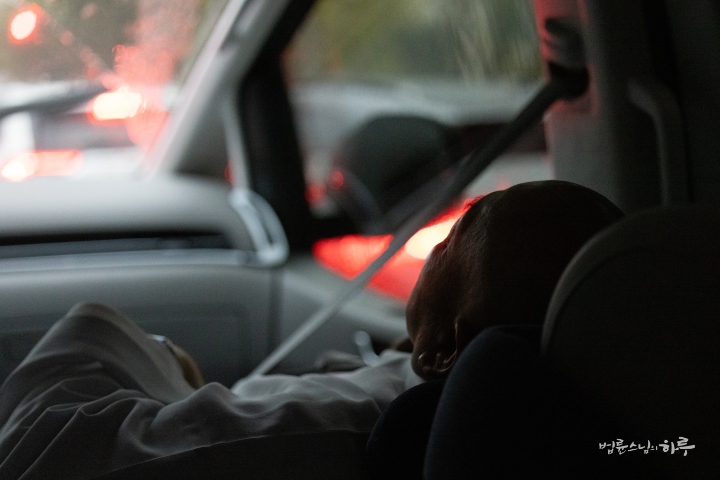

Today’s lecture was held at the Boksagol Cultural Center Art Hall located in Wonmi-gu, Bucheon City. After traveling by car for an hour and a half, Sunim arrived at the venue at 6:30 PM.

Happy Citizens who had graduated from Happiness School and were engaged in various community activities were volunteering throughout the venue. Sunim warmly greeted the Happy Citizens and moved to the waiting room.
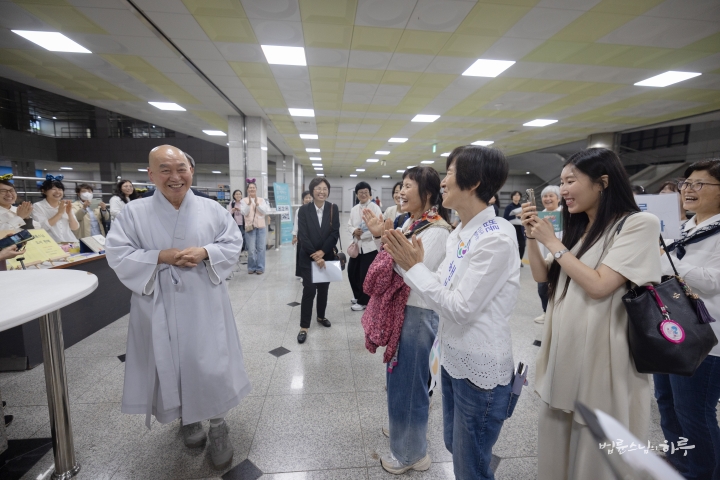
Before the lecture, Sunim had tea in the waiting room with Mr. Han Byung-hwan, Director of Boksagol Cultural Center. The director shared his connection with Sunim, saying he had been listening to Sunim’s dharma talks since his college days as a student.
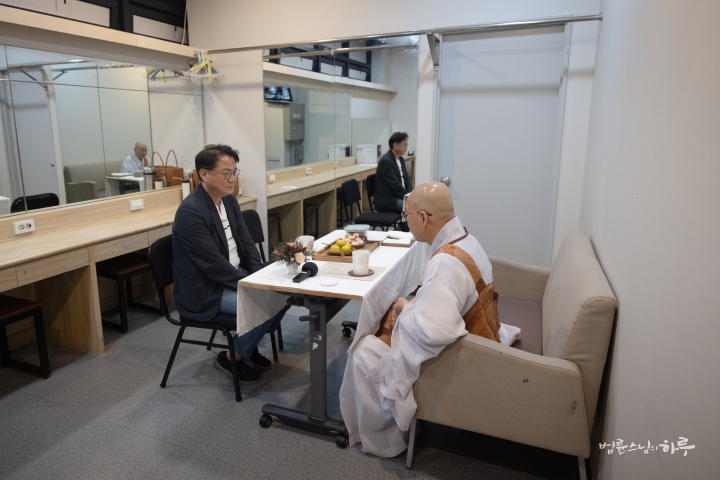
“Thank you for coming all the way to Bucheon. I was the president of the Jogyesa Temple student association. At that time, you served as our guiding Dharma teacher for the students. Thanks to you, I studied Buddhism extensively. I was amazed because your interpretation was completely different from the Buddhism I had known before.”
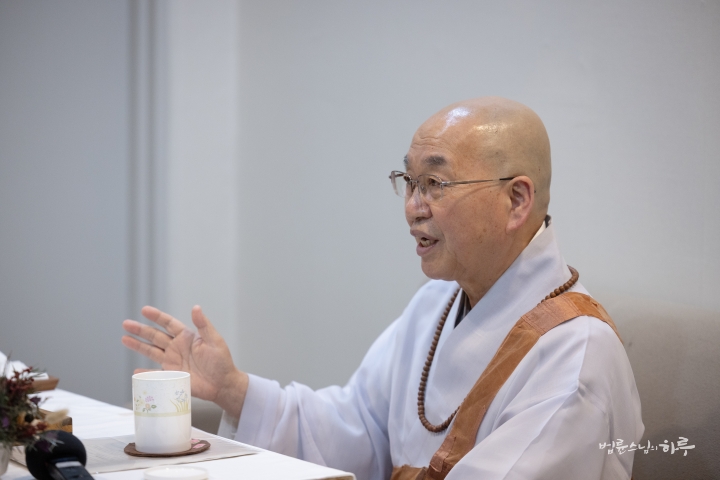
“What I wrote as a book at that time was ‘Practical Buddhist Thought.’ I was originally active in Gyeongju, but someone introduced me to the University Buddhist Federation after seeing an article I wrote for ‘Creation and Criticism.’ In 1982, I gave a lecture at Haeinsa Temple on the theme ‘Contemporary Illumination of Buddha.’ The response from the college students who heard that lecture was so positive that I was invited to become the guiding Dharma teacher for the University Buddhist Federation, which brought me to Seoul for the first time. Back then, I was expelled from temples several times for practicing ‘People’s Buddhism.'” (laughter)
“The dharma talk you gave at that time is exactly the same as the one you give now. Even at that time, you taught that Buddha’s life itself was social engagement and revolution.”
As they conversed, it was time to begin the lecture. Sunim took a commemorative photo with the director and moved to the lecture hall together.
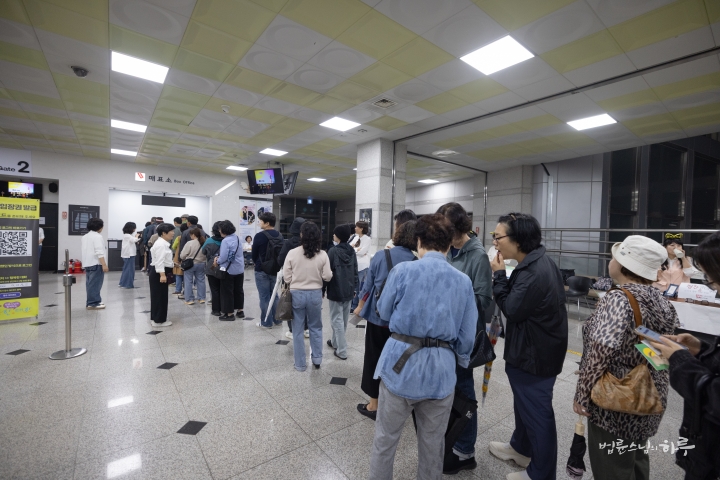
While many citizens were entering the lecture hall, a pre-performance was taking place on stage. First, the ukulele ensemble from the Bucheon Citizens’ Alliance performed lively music and songs.
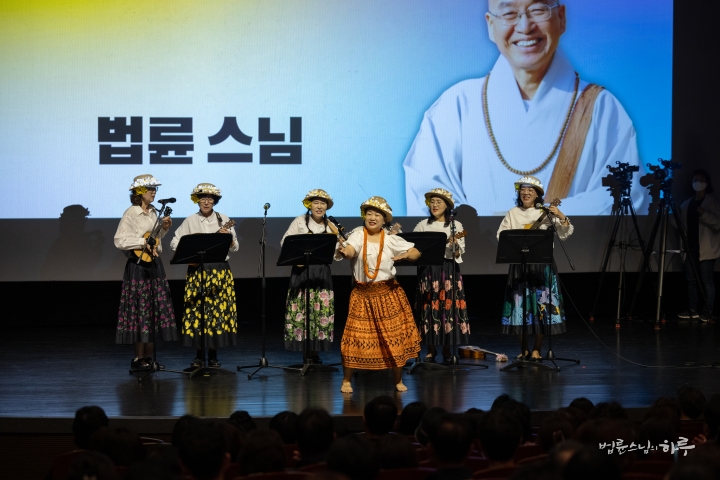
When the performance ended, Sunim personally came up on stage and took a commemorative photo with the ensemble.
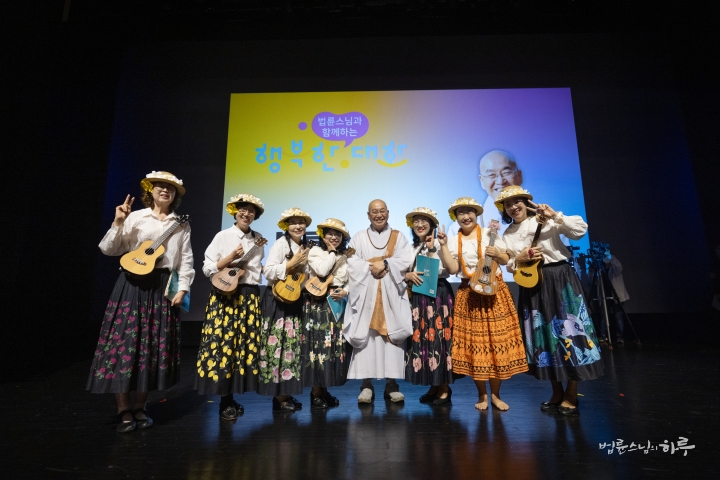
Next, singer Nan Ah-jin sang with her beautiful voice. Ms. Nan Ah-jin expressed her gratitude, saying that thanks to graduating from Happiness School and consistently listening to Venerable Pomnyun Sunim’s dharma talks, she was able to continue her activities with an even more joyful heart.

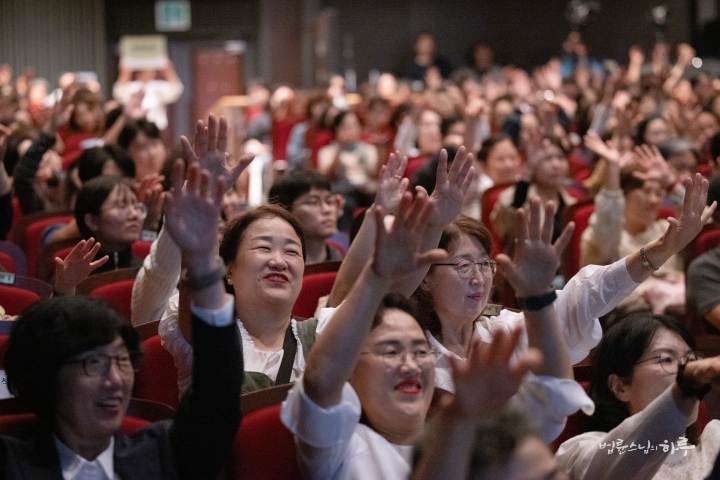
After the song ended, Sunim also took a commemorative photo with Ms. Nan Ah-jin.
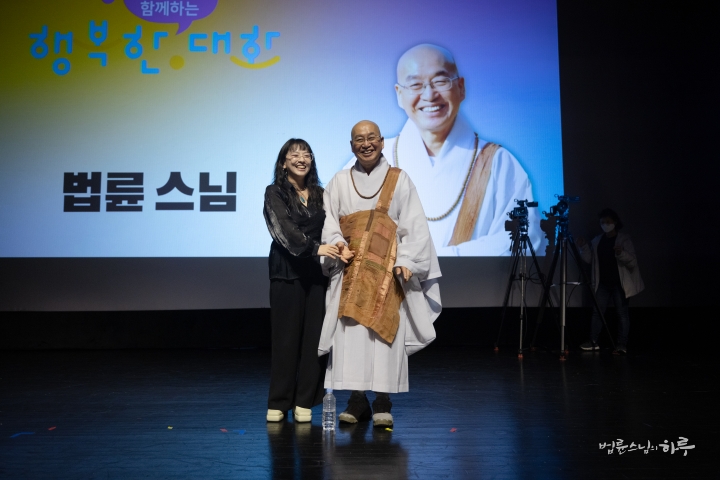
After watching an introductory video about Sunim, he walked onto the stage. The 480 Bucheon citizens who filled the lecture hall welcomed Sunim with loud applause and cheers.
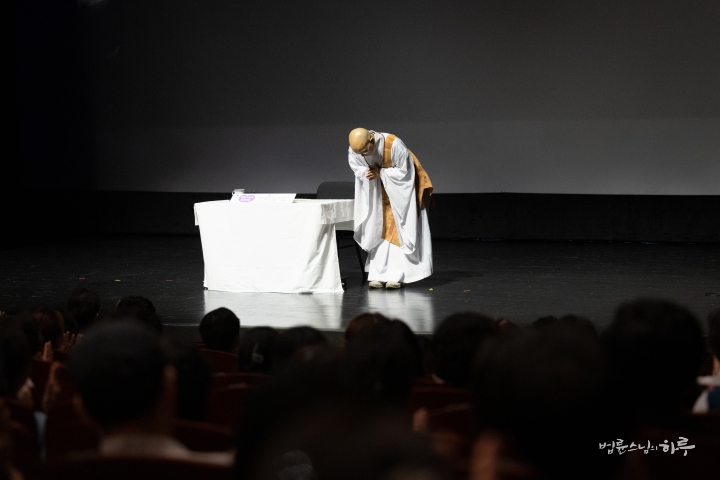
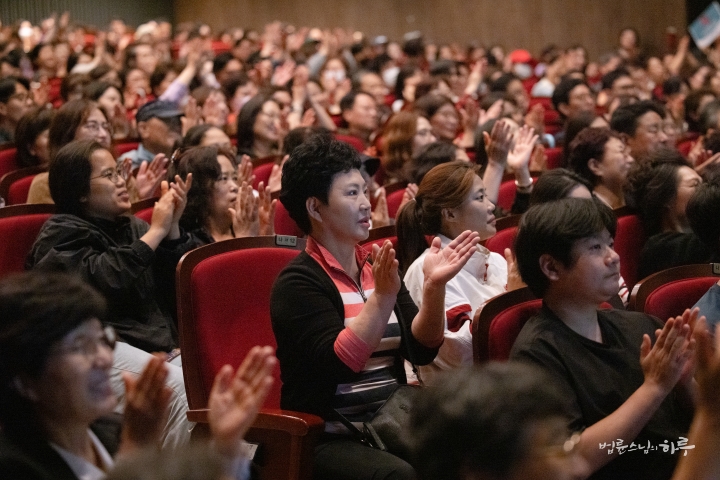
Sunim began the dialogue with opening remarks and an introduction to how the Dharma Q&A would proceed.
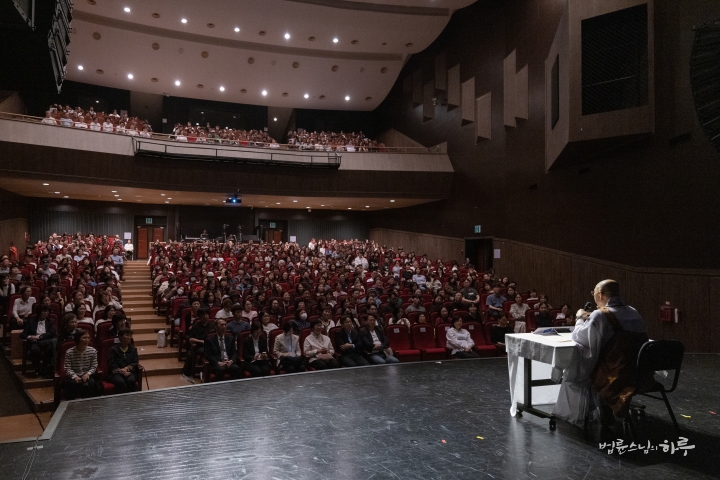
“It was very hot this summer, wasn’t it? But as they say, nothing can overcome the passage of time – the heat has passed and autumn is deepening. On this beautiful autumn day, although it’s raining outside, I’m happy to meet you all at the end of the holiday. While traveling abroad, I held Dharma Q&A sessions for overseas Koreans and had conversations with foreigners through interpreters. I arrived in Korea yesterday morning after completing my lecture tour in the eastern regions of North America. In October and November, I’ll be conducting a domestic lecture tour, and Bucheon is the first stop.
Dharma Q&A is not about me lecturing on a specific topic and telling you ‘This is how you should live your life.’ I’m someone who thinks ‘There is no predetermined way to live life.’
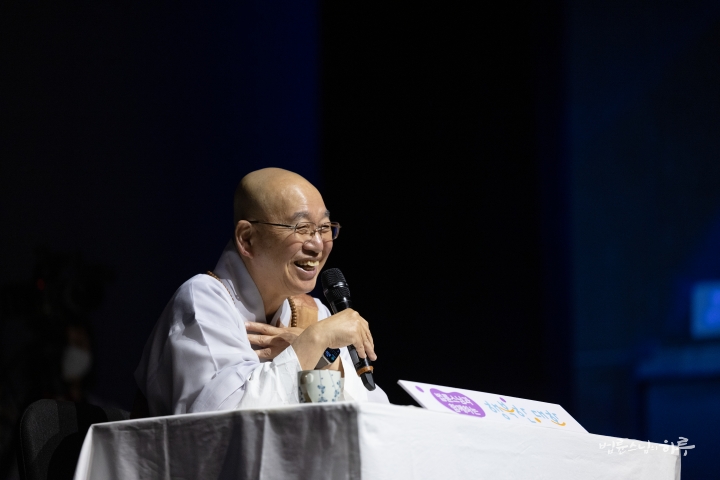
Why Do Humans, the Lords of Creation, Suffer More?
When someone asks me, ‘How should I live?’ I answer, ‘Live as you please.’ Living as you please might sound unreasonable, but if a rabbit came and asked, ‘How should I live?’ what would I answer? I’d say, ‘Live as you please.’ If a deer came and asked, ‘How should I live?’ I’d also answer, ‘Live as you please.’ These conversations seem perfectly natural, don’t they? But when a person asks and I say ‘Live as you please,’ why does it sound strange? It’s because we don’t live our lives naturally but with all kinds of artificial thoughts. That’s why humans, despite being called the lords of creation, live more miserably than wild animals and birds. Humans, the lords of creation, look at flying birds with envy. Does that make sense? Animals should envy humans, not the other way around. The fact that humans envy animals means human life is worse than that of animals in their natural state. So live naturally. Insects live, squirrels live, rabbits live – why do humans, the lords of creation, cry out that they can’t live? Life is just about living. If rabbits and squirrels can live well, why is it so hard for humans?
The only problem is that people keep complaining about how miserable they are while living as they please. Everyone receives congratulations when they get married. But after receiving all those congratulations, why do they say married life is so hard? People receive congratulations when they open a store. But once they start operating it, why do they cry out that it’s so difficult? They receive congratulations when they get a job, but once they start working at the company, why do they say it’s hard? These are all contradictions. They receive congratulations when they have a baby, but say it’s hard when raising the child. They receive congratulations when entering school, but say it’s hard when studying. If it’s really that hard, you don’t have to do it. If you lived as you pleased, why do these contradictions arise?
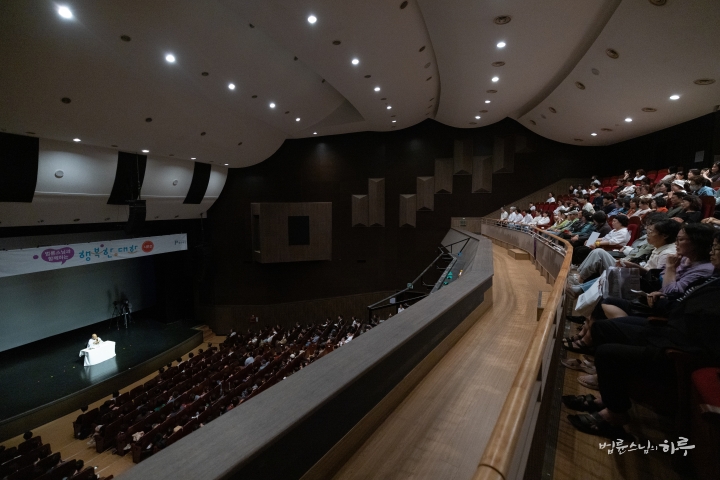
It’s not that you’re suffering because you failed an exam – you’re saying that even though you passed and received congratulations, attending school is difficult. It’s not that you couldn’t get married – you got married, received congratulations, and now you’re saying married life is hard. After receiving congratulations, you say married life is difficult; after receiving congratulations, you say working at the company is hard. Is this because God is punishing you? If God were punishing you, you shouldn’t have been hired by the company in the first place, shouldn’t have been able to open your store, shouldn’t have been able to get married. Sunim never received marriage congratulations, so I don’t complain about married life being difficult. So perhaps if you all stopped doing things that warrant congratulations, you might have nothing to suffer about. (Laughter)
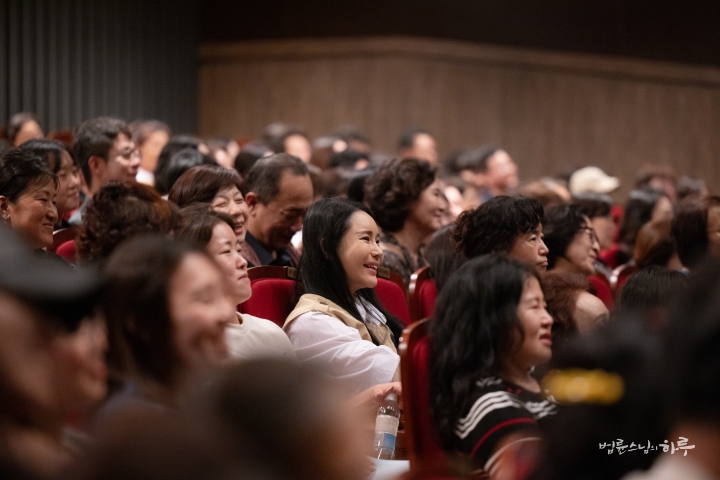
It’s not that someone is making you suffer – there’s this contradiction in your life. You’re not suffering because things didn’t work out; you’re suffering because they did work out. Did former President Yoon Suk-yeol and his wife have problems because things went poorly for them? Or because things went well? The problem didn’t arise because he lost the presidential election – it arose because he won. Looking at our country’s past presidents, most of them either went to prison themselves or their sons did. That’s why whenever there’s an election, I think, ‘It seems like our presidential elections are voting to decide who goes to prison.’ They may be doing well now, but soon they’ll all end up on that path. This all happened because things went well. People suffer when they lose presidential elections, but was it a good thing or a bad thing that they became a candidate in the first place?
It went well- that’s why they became candidates. If things had gone poorly, they couldn’t even have become candidates. Becoming a candidate was good fortune, and losing was also good fortune. While others can’t even become candidates, what’s the big deal about losing?
You Decide the Topics for Dharma Q&A
But you all are always blaming others. You get married yourself, have children yourself, get a job yourself, and then blame others. So what I want to say is – look at yourself and see what the problem really is. I have nothing to say about how life should be lived. I don’t speak unless asked. What is there to say about life? You live it, feel the contradictions, and ask questions – I simply answer what you ask.
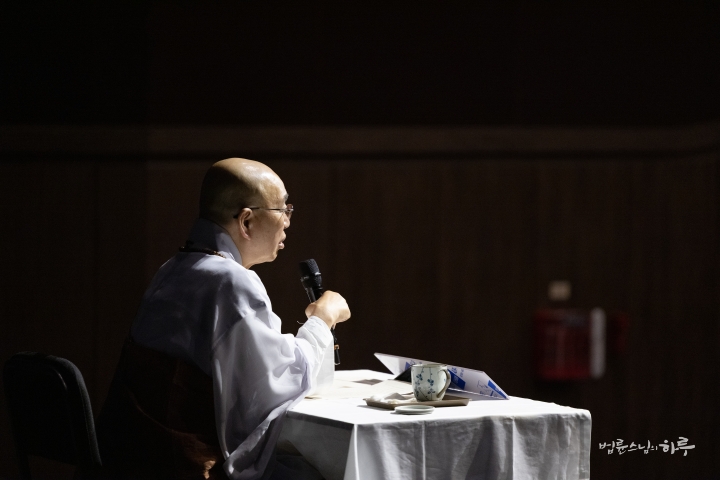
“So the topics of Dharma Q&A are chosen by you. If you talk about life stories, it becomes a life class. If you talk about science, it becomes a science class. If you ask about religion, it becomes a religion class. If you ask about society or politics, it becomes a social and political class. This lecture is not created by the speaker but by you, the audience. I only look at the parts where the questioner is struggling. I don’t look at whether it’s ethically right or politically correct. The goal of our dialogue is to live a life free from anguish and suffering. Since the goal is to attain nirvana, it’s okay to talk about anything. What the questioner is agonizing over is just the material for our conversation. So please don’t gossip about things like ‘that person got divorced’ or ‘that person had an affair.’ Now, let’s begin our dialogue.”
Following this, five people who had pre-registered their questions were given the opportunity to ask Sunim questions. Toward the end of the lecture, three more people from the audience raised their hands and asked Sunim questions. One of them sought Sunim’s advice on how to break free from a repetitive dating pattern of only meeting avoidant-type people and how to have a healthy relationship.
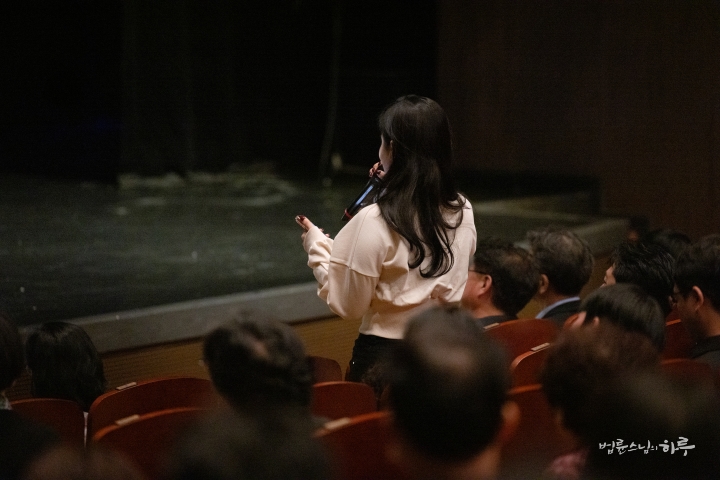
I Keep Getting Hurt in Relationships
“First, you can simply not date.”
“I’m quite old.”
“If you don’t date, these problems won’t arise at all.”
“But then I won’t be able to get married.”
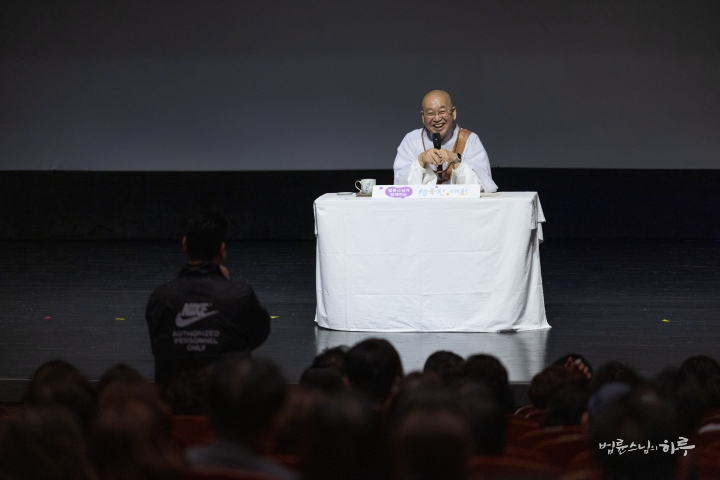
“At the level you’re describing, if you get married, do you think your married life will go well or not? What’s better – getting married, receiving congratulations, and having a difficult married life, or not receiving congratulations and not having difficulties?”
“It’s better not to receive congratulations and not have difficulties.”
“Exactly. So at your current level, it’s better not to date or get married. I’m not saying never date – I’m saying since you find dating so difficult, don’t do it for now. Do you prefer being alone quietly, or do you prefer meeting and talking with someone, whether male or female?”
“I prefer meeting someone and dating.”
“Usually that’s the case. That’s why people date. But right now, meeting someone is actually not good for you, isn’t it?”
“It is good. It’s just constantly difficult.”
“Saying it’s good but difficult is exactly like saying you received congratulations for getting married but married life is hard and difficult. In that case, it would have been better not to get married in the first place.”
“Then can I at least date?”
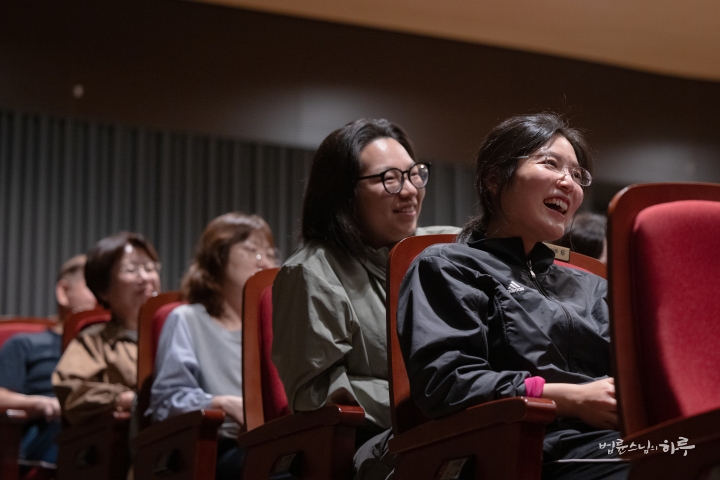
“You shouldn’t date either. You said dating is difficult. If dating is good but married life is hard, then you could just date and not get married. But since you say even dating is difficult, don’t date. If someone tells me, ‘Sunim, drinking is so hard for me,’ what would I say? ‘Then don’t drink!’ If they say ‘Smoking is so terribly difficult,’ I’d answer ‘Really? Then don’t smoke.’ Even if they said ‘I really love smoking,’ I should say ‘It’s bad for your health, so don’t smoke.’ But when they say smoking is difficult, of course I’d tell them not to smoke. Dating is the same. If you really like someone so much that you have to meet them secretly behind Sunim’s back, that’s real dating. But if dating is difficult, just don’t date. There’s no need to worry about it. Do I live as a monk because I enjoy it? Or do I do it even though it’s hard?”
“You must do it because you enjoy it.”
“Right. But if I complained, ‘Being a monk is so terribly difficult,’ you would tell me to quit. People know all the answers to others’ problems but don’t know the answers to their own. So if dating is difficult, just don’t do it.
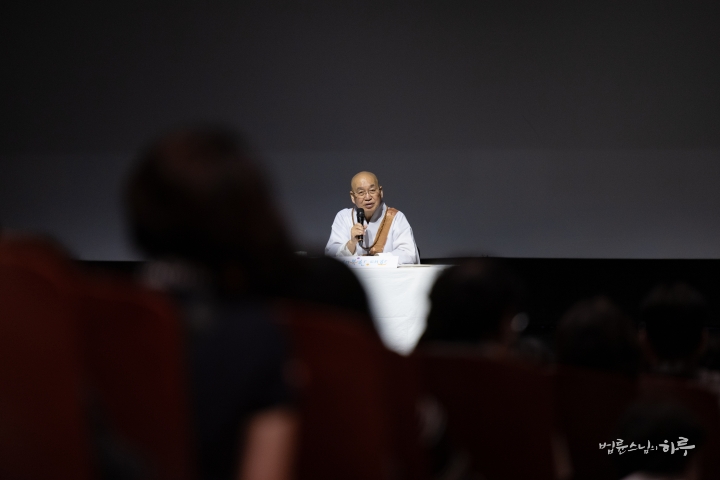
Dating is something people do because they like each other, so why is it difficult? Think about it. What does it mean when you like drinking but feel terrible afterward? It means you drank too much. In that case, you should reduce or quit. In other words, if smoking feels good but you feel terrible afterward, it means you smoked too much, so you should smoke less or not at all. Similarly, what does it mean when dating starts out good but becomes difficult later?”
“Should I not date either?”
“Check your condition once more. When dating starts out good but becomes increasingly difficult over time, it means you have high expectations of your dating partner. In other words, you have many demands. If you don’t give much but only try to receive from the other person, they will run away. Simply put, if you keep clinging, it becomes annoying. In this situation, when the other person runs away, you perceive them as avoidant. Asking ‘Why is everyone I meet avoidant?’ means you’re sticking to them like gum. You need to recognize your own behavior. When gum sticks and you peel it off, it sticks here; peel it off again, it sticks there – acting sticky like taffy makes the other person struggle and leave.
People should be crispy like rice crackers. Not too moist, but appropriately dry. You’re acting damp like British weather, so the other person is leaving. You shouldn’t cling too much or make too many demands. Keep an appropriate distance. When they want to meet, say you’re busy and only meet occasionally. That way, they’ll be anxious and contact you again.”
“In my last relationship, actually the other person was obsessed with me, so I didn’t contact them much and was about to suggest ending it.”
“If it was good, why end it?”
“I thought I should end it because the other person got angry.”
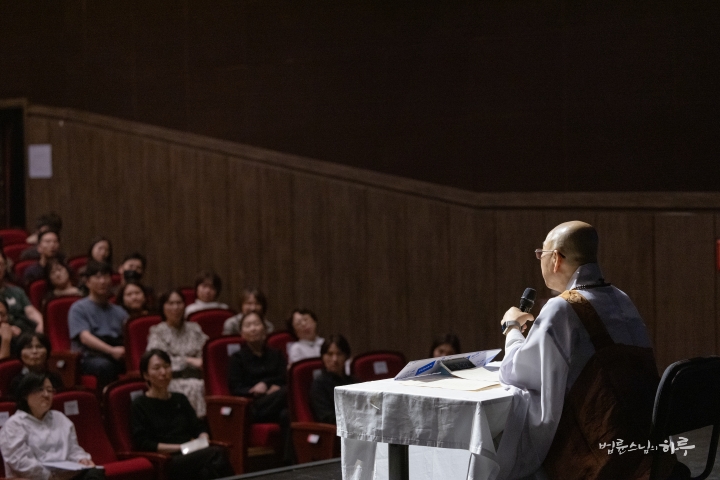
“What does getting angry mean? It means they got angry at your behavior at some point. Then just don’t do those behaviors. It’s not bad when someone leaves because they don’t like you. It’s actually good. If they leave because they don’t like you, in this case, you’re not being clingy. Since you’re not clinging, there’s space, and someone else can enter that space. Then you can meet someone else. How wonderful is that? Conversely, if someone is clinging tightly to you, that’s fine in its own way. But if you try to peel them off, that means you’re being greedy. It means you’re only looking for what’s too good.
You know the wealth gap is rapidly widening these days, right? In the past, when people were born in a village, they lived their whole lives in that village and chose partners from among the villagers, thinking ‘that man is nice’ or ‘that woman is nice.’ But now it’s easy to go live in the city, and through YouTube and the internet, we see people from all over the world every day. We also encounter movie stars and singers daily, so people’s standards have become much higher. Biologists say that females try to mate with the strongest males for the health of their offspring. If there are 10 females and 5 males, only one succeeds in mating while the other males lose out in competition. This is nature’s way. I’m not sure if it’s related to this instinct, but as the world has expanded, all women don’t look at ordinary men their age – they only look at the top 10 percent of men. Whether for dating or marriage. So the top 10 percent of men have an abundance of women to meet, but the remaining 90 percent of men can’t even get a single date. Women simply won’t respond to them. So if you want to date or marry a man you like, you should assume there are already at least 10 women around him. So it’s natural that things won’t go your way.
What about from men’s perspective? Ordinary men find it difficult to get opportunities to date women. They can’t even make contact. All women only look at the top 10 percent. This is the current phenomenon in our society. Ultimately, we’re becoming a society where women live alone because there are no men they like, and men can’t marry even though they want to because no women will look at them. This isn’t a matter of ethics or morality – it’s a social phenomenon.
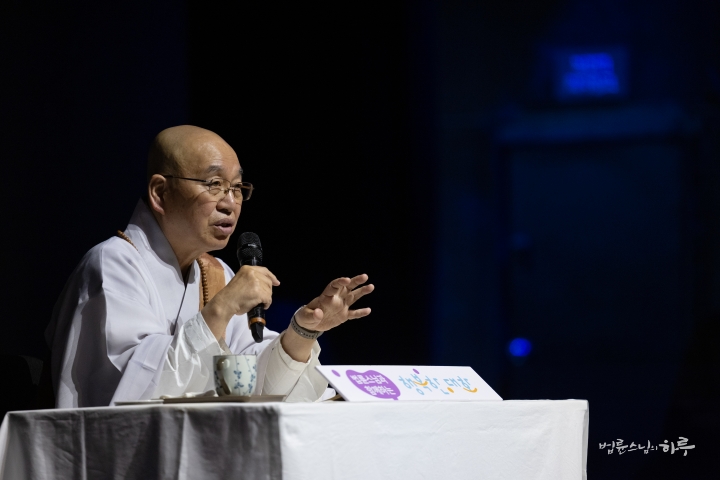
“So you need to understand that people who appeal to you will also appeal to others. That’s why someone who initially likes you might leave when another person appears. It’s not because that man betrayed you. So if you want to date, you need to play the push-and-pull game appropriately.”
“But I’m not good at playing push-and-pull.”
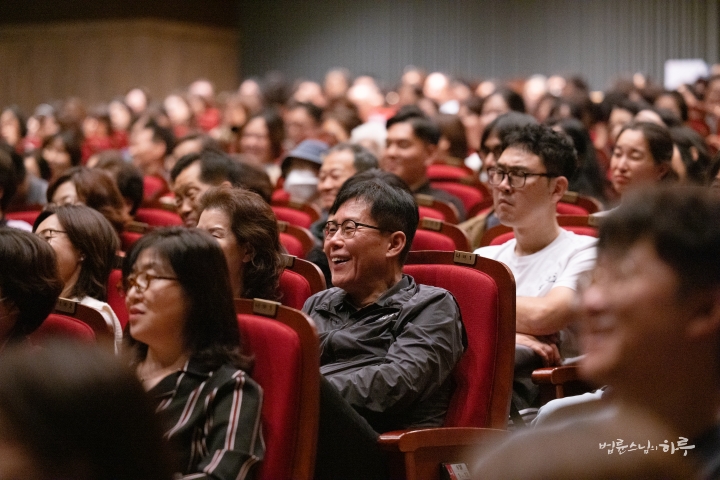
“Not being able to play push-and-pull means you’re clinging. You either act exactly according to your temperament, or you immediately turn away when things don’t work out. Instead of clinging, it’s better to maintain an appropriate distance. When the other person grows distant, you can call them first. When they become too clingy, you can avoid them a little to prevent things from getting too sticky.”
“Is there no such thing as a sticky relationship for life?”
“Being sticky can be good too. It means you have a lot of affection. In the past, people viewed those with lots of affection positively, but nowadays young people find stickiness burdensome. For example, when eating, grandmothers used to tear kimchi and put it on your rice saying ‘eat this, eat that,’ and people liked it. But nowadays, if a grandmother scoops rice, puts kimchi on top, and tells you to eat it, people run away. In the past, they said ‘there’s no tree that won’t fall after ten strikes,’ and following a woman you liked, standing in front of her house with flowers, or bowing was called ‘earnest love.’ But nowadays, doing this would be stalking. Times have changed.
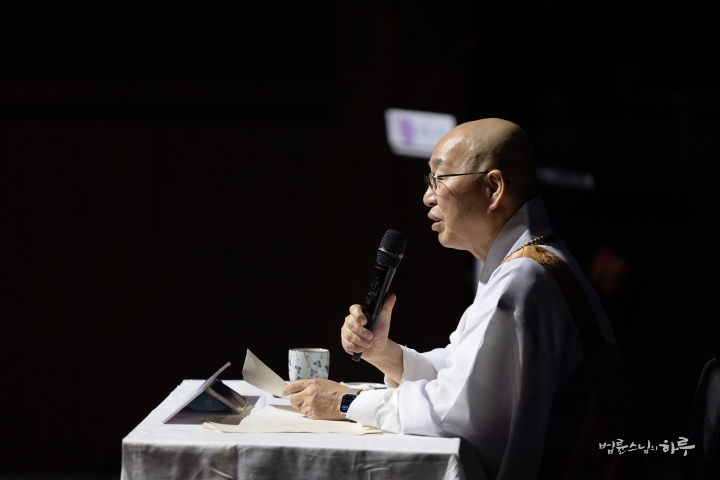
You’re a young person now, but you seem to understand the changes of the times less than this old monk. That’s why you can’t date. There’s no secret to dating well. Questions like ‘Isn’t there a way to date well and meet a good man?’ themselves show that you’re only talking about your own position without considering the other person.
To date well in the future, you need to observe and respect the other person’s situation and position. When the other person says no, if you don’t like it either, you can stop. Even if you like them, you shouldn’t cling desperately. You need to respect the other person and know how to wait. Conversely, when the other person likes you but you don’t like them, you shouldn’t curse or ignore them. It’s something to be grateful for that they like you. Who would like a woman like me? Since it’s something to be thankful for that the other person likes you, you should say ‘No thank you!’ You shouldn’t say ‘I hate it!’ like that. You should say politely, ‘Thank you for liking me, but I’m not interested.’ Try doing it that way.”
“Yes. Thank you.”
“It’s really interesting. Even though she says it’s so painful, she still wants to date.” (laughter)
Questions continued one after another.
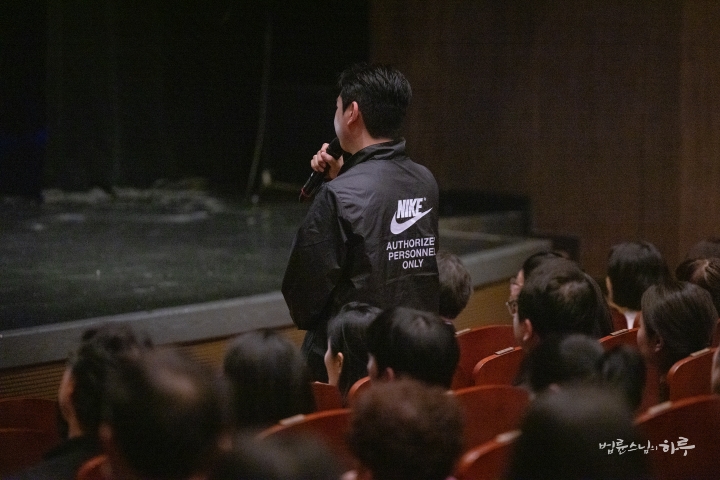
As a soon-to-be father, how can I become a good dad to my baby and a reliable husband to my wife?
When my foreign wife faces discrimination, how can I accept it generously without feeling anger or hatred?
How can I manage the depression from growing up in a divorced family and my complicated feelings toward my mother to live happily?
How can I escape from the obsessions and bad memories stemming from being bullied during my school days?
What should I do when people curse and slander me? Do I have to give up the love I want to receive from people to be happy?
My brother is on trial in detention. He got involved in illegal activities because he wanted to make money quickly and easily. What can I do to help as his sibling?
My son is detained for injuring his daughter by hitting her. I was so shocked that I became ill. What should I do?
Although Sunim’s voice was a bit hoarse due to jet lag, he continued the conversation energetically for the citizens who attended. The promised two hours passed quickly as we talked.
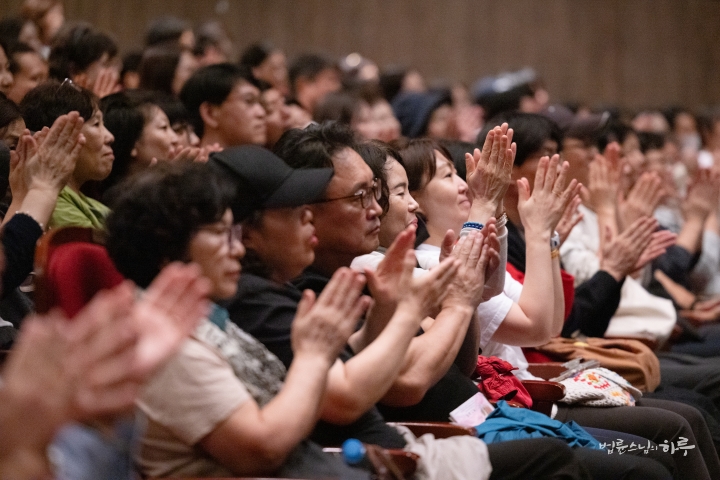
After finishing the lecture, Sunim immediately started a book signing session. Many citizens lined up to receive autographs and express their gratitude to Sunim.
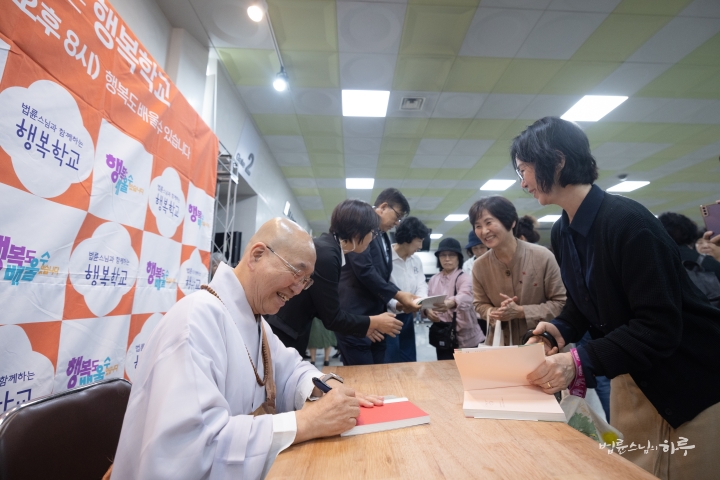
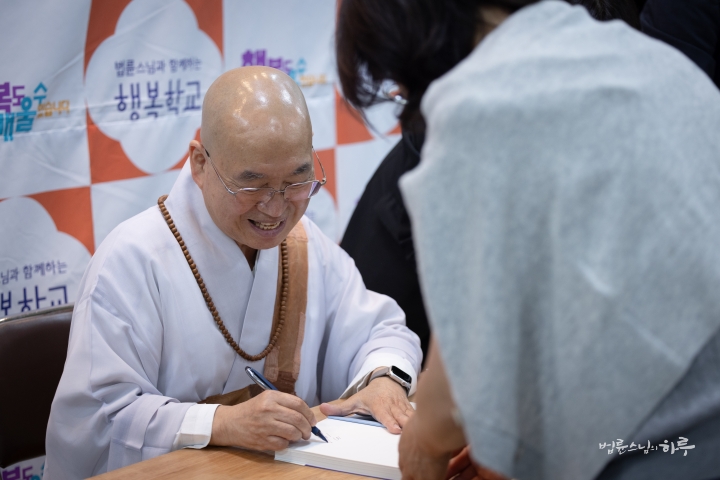
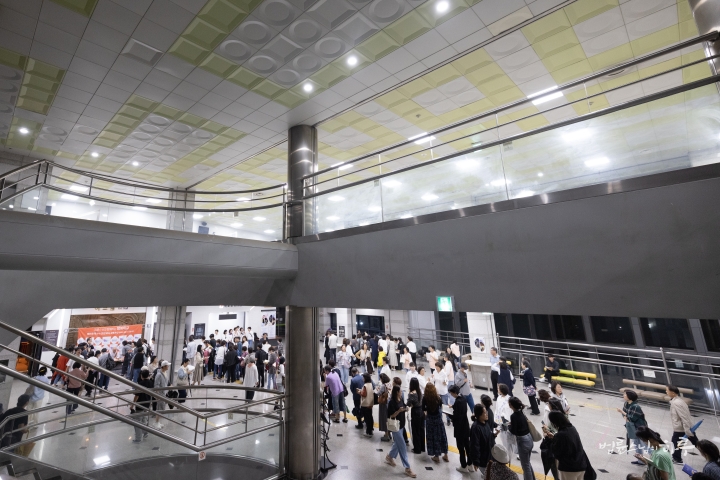
After all the citizens had left the lecture hall, Sunim took a commemorative photo with the Happy Citizens who had prepared the lecture.
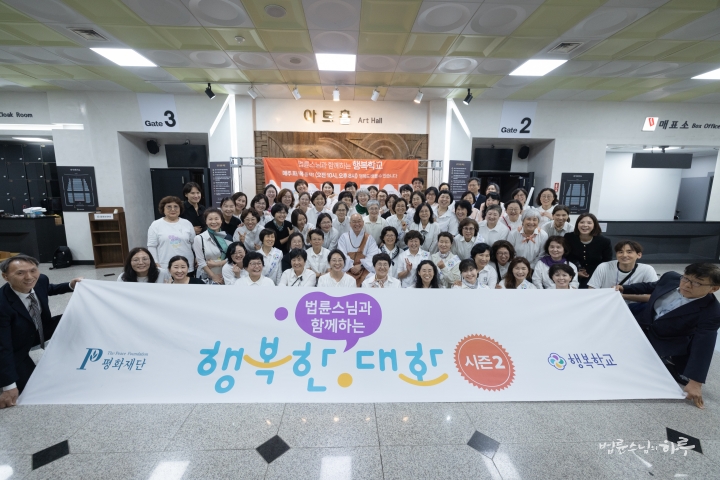
“Bucheon Happy Citizens, fighting!”
After expressing his gratitude to the volunteers, Sunim immediately got in the car and headed to Dubuk Jungto Retreat Center.
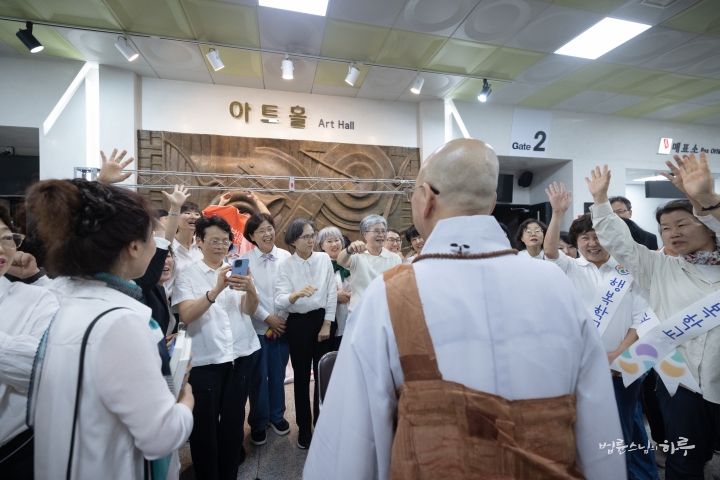
“I need to go to Dubuk Jungto Retreat Center, so I’ll leave first. Thank you all for your hard work.”
Leaving Bucheon City at 10 PM, after traveling for 3 hours and 40 minutes, Sunim arrived at Dubuk Jungto Retreat Center at 1:40 AM and concluded his day.

Tomorrow morning, Sunim will have an online Dharma Q&A session with Jungto Dharma School students, and in the afternoon, he plans to do communal work in the vegetable garden.





